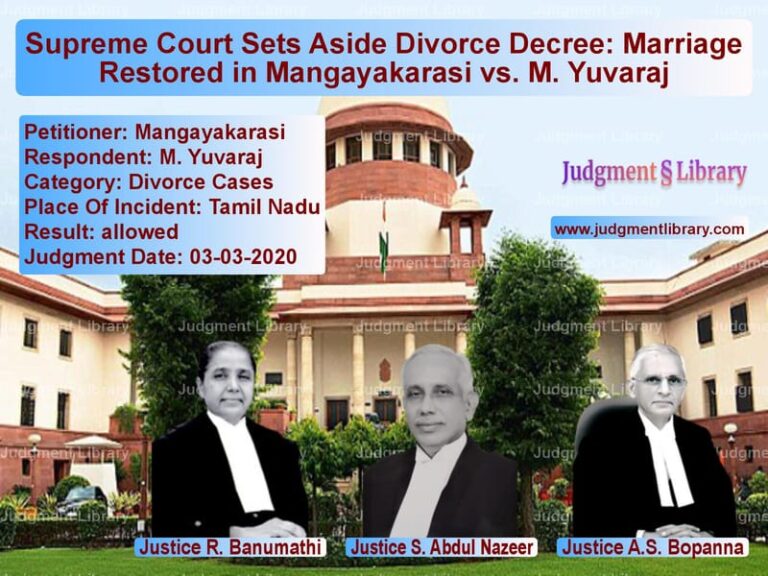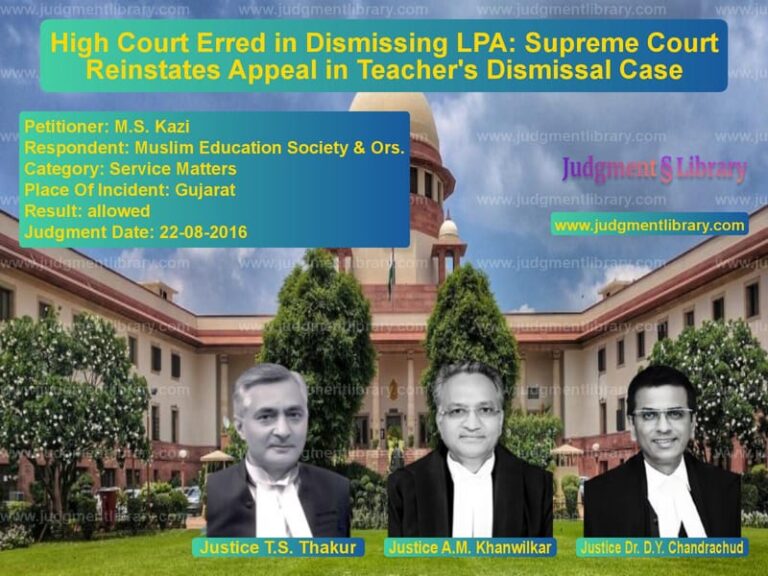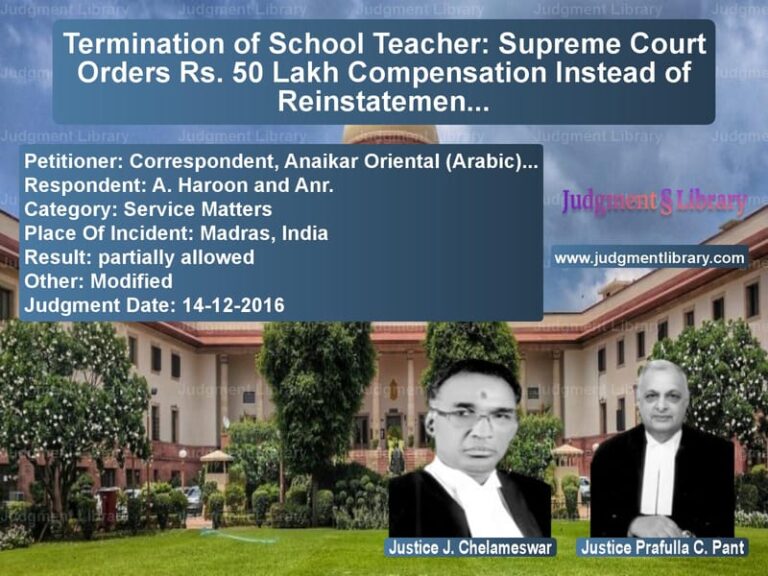Supreme Court Rules on Land Acquisition: No Lapse of Proceedings Under Section 24(2) of the 2013 Act
The case of Union of India Through Land Acquisition Collector vs. Rajesh Kumar & Ors. addresses a significant dispute regarding land acquisition and whether such proceedings lapse under Section 24(2) of the Right to Fair Compensation and Transparency in Land Acquisition, Rehabilitation and Resettlement Act, 2013. The Supreme Court ruled that acquisition proceedings do not lapse if possession has been taken, even if compensation has not been disbursed to the landowners.
This judgment provides clarity on the retrospective application of the 2013 Act and prevents landowners from using technical grounds to claim lapse of acquisition proceedings that were legally completed.
Background of the Case
The dispute concerns land acquisition in New Delhi under the Land Acquisition Act, 1894. The landowners sought relief under the 2013 Act, arguing that the acquisition should be considered lapsed because compensation had not been paid.
Key events leading to the dispute:
- September 22, 1997: Possession of the land was taken by the authorities.
- 2001: Compensation was deposited in the government treasury, but the landowners refused to accept it.
- 2014: The landowners filed a writ petition before the Delhi High Court, claiming that the acquisition had lapsed under Section 24(2) of the 2013 Act.
- 2014: The Delhi High Court ruled in favor of the landowners, declaring that the acquisition had lapsed.
- 2018: The Union of India challenged the High Court’s decision, arguing that the ruling was inconsistent with legal precedents.
- March 13, 2023: The Supreme Court overturned the Delhi High Court’s ruling.
Legal Provisions Under Scrutiny
The case primarily revolves around Section 24(2) of the 2013 Act, which states:
“In case of land acquisition proceedings initiated under the Land Acquisition Act, 1894, where an award has been made five years or more prior to the commencement of this Act but compensation has not been paid and physical possession has not been taken, such proceedings shall be deemed to have lapsed.”
The landowners argued that since compensation had not been physically paid to them, the acquisition had lapsed. The government, however, contended that possession had already been taken and the compensation was deposited, fulfilling the conditions required to uphold the acquisition.
Read also: https://judgmentlibrary.com/supreme-court-rules-against-lapse-of-land-acquisition-under-section-242/
Arguments by the Appellant (Union of India)
The government, represented by the Land Acquisition Collector, challenged the Delhi High Court’s ruling on the following grounds:
- Possession of the land had already been taken on September 22, 1997.
- Compensation had been deposited in the government treasury in 2001, and the refusal of the landowners to accept it should not affect the validity of the acquisition.
- The Delhi High Court incorrectly relied on Pune Municipal Corporation & Ors. vs. Harakchand Misirimal Solanki & Ors., which had been overruled.
- As per the Supreme Court’s Constitution Bench ruling in Indore Development Authority vs. Manoharlal & Ors., possession or deposit of compensation prevents lapse under Section 24(2).
- The objective of the 2013 Act was not to invalidate valid land acquisitions but to ensure fair compensation.
Arguments by the Respondents (Landowners)
The landowners, represented by their legal counsel, argued:
- Despite possession being claimed by the government, physical possession was never handed over to any authority.
- Compensation had not been disbursed, and as per the 2013 Act, this results in the deemed lapse of acquisition.
- The Supreme Court’s ruling in Pune Municipal Corporation had established that compensation must be physically paid, not merely deposited in the government treasury.
- Allowing the government to retain possession without paying compensation is contrary to the principles of fairness and natural justice.
Supreme Court’s Judgment
The Supreme Court overturned the Delhi High Court’s decision, ruling that there was no lapse of acquisition.
1. High Court Erred in Relying on Overruled Precedent
The Court noted that the High Court had relied on Pune Municipal Corporation, which had been overruled in Indore Development Authority:
“The decision in Pune Municipal Corporation is hereby overruled and all other decisions in which Pune Municipal Corporation has been followed are also overruled.”
2. Possession Had Been Taken Before the 2013 Act Came Into Force
The Court ruled that since possession had been taken in 1997, the provisions of the 2013 Act could not be applied retroactively:
“Once possession has been taken, there is no lapse under Section 24(2) of the 2013 Act.”
3. Compensation Need Not Be Physically Paid for Acquisition to Be Valid
The Court clarified that compensation deposited in government accounts fulfills the requirement under the Act:
“Non-deposit of compensation in court does not result in the lapse of land acquisition proceedings.”
4. Section 24(2) Does Not Create a New Cause of Action
The Court ruled that the 2013 Act does not reopen completed acquisitions:
“Section 24 applies to a proceeding pending on the date of enforcement of the 2013 Act and does not revive stale claims.”
Final Ruling
The Supreme Court:
- Overturned the Delhi High Court’s ruling.
- Held that the land acquisition did not lapse under Section 24(2) of the 2013 Act.
- Dismissed the landowners’ writ petition.
Implications of the Judgment
This ruling is significant for land acquisition cases across India:
1. Clarifies Section 24(2) of the 2013 Act
- Landowners cannot claim lapse of acquisition solely based on non-payment if possession has been taken.
- The government’s deposit of compensation is considered valid payment.
2. Impact on Government Projects
- The ruling ensures that infrastructure and public projects are not delayed by retrospective claims.
- Prevents landowners from using procedural technicalities to stall land acquisition proceedings.
Conclusion
This ruling clarifies the interpretation of Section 24(2) of the 2013 Act and prevents reopening of completed acquisitions based on procedural technicalities. It ensures that public projects are not stalled due to retrospective claims by landowners.
Petitioner Name: Union of India Through Land Acquisition Collector.Respondent Name: Rajesh Kumar & Ors..Judgment By: Justice M.R. Shah, Justice Manoj Misra.Place Of Incident: New Delhi.Judgment Date: 13-03-2023.
Don’t miss out on the full details! Download the complete judgment in PDF format below and gain valuable insights instantly!
Download Judgment: union-of-india-throu-vs-rajesh-kumar-&-ors.-supreme-court-of-india-judgment-dated-13-03-2023.pdf
Directly Download Judgment: Directly download this Judgment
See all petitions in Property Disputes
See all petitions in Landlord-Tenant Disputes
See all petitions in Damages and Compensation
See all petitions in Specific Performance
See all petitions in Contract Disputes
See all petitions in Judgment by Mukeshkumar Rasikbhai Shah
See all petitions in Judgment by Manoj Misra
See all petitions in allowed
See all petitions in Quashed
See all petitions in supreme court of India judgments March 2023
See all petitions in 2023 judgments
See all posts in Civil Cases Category
See all allowed petitions in Civil Cases Category
See all Dismissed petitions in Civil Cases Category
See all partially allowed petitions in Civil Cases Category







